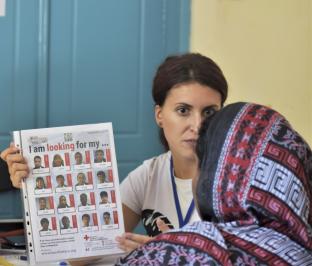
As a consequence of armed conflicts, people inevitably die or go missing, causing suffering and anguish for their families and their communities. People have the right to know what has happened to their loved ones, while governments, armed forces and armed groups must provide information and help reunite families.
If a missing person is alive, the first concern is obviously to find them and to make sure that they are treated in conformity with the law, according to the category to which they belong (civilian, POW, wounded and sick, etc.). If the person is found dead, their family must be informed about the circumstances of the death and the place of burial. Respect for human dignity applies beyond a person’s death to their remains. This is all the more relevant in the current COVID-19 pandemic, as handling the remains of COVID-19 victims may pose additional challenges in countries already affected by armed conflicts. Finally, the feelings of the family and the community towards the dead must also be taken into consideration.
In light of the additional challenges posed by the COVID-19 pandemic, how do international law and IHL tackle all these concerns? What measures must parties to armed conflicts take to clarify the fate of missing persons? What must be done to bring families back together? And if the missing person is found dead? This highlight seeks to address these questions through various case studies and resources available on” How does law protect in war?” and the ICRC’s website.
VERSION FRANCAISE (PDF) => CLIQUEZ SUR LE LIEN SUIVANT: Coup de projecteur sur les personnes portées disparues et les morts disponible sur le site du blog Quid Justitiae de la Clinique de droit pénal et humanitaire (traduction de l'Université Laval).
- UN, Working Group on Enforced or Involuntary Disappearances: Report on Mission to Serbia, including Kosovo (also relevant for obligations regarding the dead)
- Israel, Evacuation of Bodies in Jenin
- Treatment of the Dead in Afghanistan (also relevant for the treatment of remains)
- ICRC/Lebanon, Sabra and Chatila
- United States of America, The Death of Osama bin Laden (with a focus on Islamic requirements for burials)
- Syria/Germany, Conviction for taking photographs
- ICRC, Tracing Service [5]
- Bosnia and Herzegovina, Release of Prisoners of War and Tracing Missing Persons After the End of Hostilities
- The legal factsheet on Missing persons and their families
- The legal factsheet Humanity after life: Respecting and Protecting the Dead
- On the management of the dead under Islamic law, read the following document
- The International Review of the Red Cross’ edition No. 905 examining the needs of missing persons and their families, the mechanisms aimed at clarifying the fate of missing persons as well as the measures taken to identify the dead
- A blog post on the IHL framework about missing persons and the restoration of family links
- An online event on the operationalization of the UN Security Council Resolution 2474 on missing persons, exploring concrete avenues through which States and relevant international organizations can fulfil obligations and commitments in this regard
- The 2020 Report of the UN Secretary-General on Missing persons (in 6 languages), which addresses the international legal and institutional framework applicable to the issue and identify the various measures being taken to prevent people from going missing and clarify the fate and whereabouts of missing persons
- The ICRC COVID-19 general guidance for the management of the dead, including recommendations for authorities and forensic institutions
- On the management of the dead under Islamic law, including in the current COVID-19 pandemic, read the following analysis on COVID-19 and Islamic burial laws: safeguarding dignity of the dead, and watch here the Q&A on COVID-19 and Islamic Burials
- A legal factsheet on how IHL provides crucial safeguards during pandemics
- A whole Humanitarian Law & Policy blog series on issues related to the current COVID-19 pandemic, humanitarian action in conflict zones and IHL
